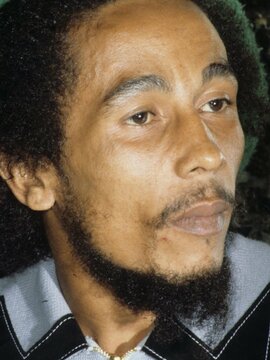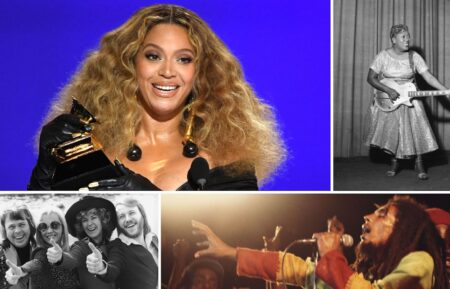Bob Marley

Singer • Musician • Songwriter • Activist
Birth Name: Nesta Robert Marley
Birth Date: February 6, 1945
Death Date: May 11, 1981
Birth Place: Nine Miles, St. Ann, Jamaica
Children: Ziggy Marley, Damian Marley, Cedella Marley, Stephen Marley
As the most popular and influential reggae musician of all time, Bob Marley was the first superstar to emerge from a developing country while establishing himself as the voice of protest for the world's oppressed peoples. In joining forces with future reggae stars Bunny Livingston and Peter Tosh, Marley rose to international acclaim as the front man for The Wailers with such acclaimed albums as Catch a Fire (1973) and Burnin' (1974). But as soon as the group started to become known outside of Jamaica, the three decided to pursue their own solo careers. While they all achieved a great deal of individual success, it was Marley who went on to legendary status. Now touring and recording as Bob Marley and the Wailers, the artist spent the next six years recording some of his finest music with albums like Rastaman Vibration (1976), Exodus (1977) and the live recording Babylon by Bus (1978). Marley's influence was felt far and wide with song like "No Woman, No Cry," "Is This Love" and "Jamming," all of which helped advance the popularity of reggae music across the world. But following the successful release of his final studio album, Uprising (1980), Marley fell ill and discovered cancer rapidly spreading through his body. Following his death in 1981, his stature only grew, particularly following the compilation album, Legend (1984), which became the biggest seller of his career. Because of his enormous popularity, Marley was the face of reggae music and one of the most influential musicians of the late 20th century, thanks in part to his outspoken dedication to speaking for those without a voice.
Born on Feb. 6, 1945 in Nine Mile, Saint Ann Parish, Jamaica, Marley was raised by his white father, Norval Marley, a captain in the Royal Marines and plantation overseer, and his Afro-Jamaican mother, Cedella Booker. Because of pressure from Norval's family, Marley saw little of his father as a child, though financial support was provided. When he was 10 years old, his father died of a heart attack at the age of 60, leaving his mother to be sole breadwinner. Toward the end of the 1950s, his mother moved her son to Kingston and eventually settled in nearby Trenchtown, where a growingly aware and dissatisfied Marley began hanging out with other impatient street youths. It was at this time that he struck a friendship with Neville "Bunny" Livingston, and soon the pair began exploring the music of Ray Charles, Curtis Mayfield and The Drifters, which was broadcast from a radio station in New Orleans. Determined to become a musician himself, Marley quit school when he was 14 and began to play music with a local artist named Joe Higgs, where he met another key figure, Peter Tosh. In 1962, he recorded his first song, "Judge Not," though it failed to gain much traction.
Undeterred by his unsuccessful debut, Marley recorded more singles like "Terror" and "One Cup of Coffee," and met with the same results. He concluded that his only path to success was by way of forming a band. So in 1963, Marley joined forces with Livingston and Tosh to form The Wailing Wailers. After hooking up with Kingston producer Clement Dodd, Marley's new band recorded the track "Simmer Down," which spent a solid two months atop the Jamaican charts and helped propel The Wailing Wailers into stars on their native island. The group went on to record 30 or so more songs in the next few years, which solidified their popularity, but did little to help their financial situation. Three of the band's members quit, leaving Marley with Tosh and Livingston. Meanwhile, his mother had remarried and moved to Delaware, where he joined her in 1966 with his new wife, Rita Anderson. Marley spent the next eight months earning a more mundane living at a DuPont lab and a Chrysler assembly line before returning to Jamaica in October 1966. Upon his return, he was drawn to the resurgence of the Rastafarian movement, which had begun to take on a more spiritual commitment toward social issues.
Marley's music began to reflect the tenor of his new beliefs and the legacy for which he became known was born. He reunited with Tosh and Livingston to form The Wailers, only to have a falling out with Clement Dodd over their new musical direction. Following a failed attempt to form their own record label, Wail N' Soul, the group entered a fruitful period with songs like "Soul Rebel" and "Small Axe" that helped define the new direction that reggae music was making at the time. But The Wailers continued struggling to establish themselves on firm footing even after signing a contract with CBS, where they found themselves broke and stranded in London after a tour with soul singer Johnny Nash. With nothing to lose, Marley approached Island Records' head Chris Blackwell, who at the time ran the hottest independent label in the world. Marley managed to secure an advance to record their first album, Catch a Fire (1973), which marked the first time a reggae band had received the full studio treatment from a large recording label. Featuring the Tosh song "Stop That Train" and Marley's own "Stir It Up," the album's politically-charged lyrics took some by surprise, though the underlying message of idealism and change was warmly accepted. Though not a huge seller, Catch a Fire remained one of Marley's finest achievements and stood the test of time as one of the better reggae albums ever made.
Later that year, The Wailers released Burnin' (1973), which contained later classics like "Get Up, Stand Up" and "I Shot the Sheriff," the latter of which caught the attention of Eric Clapton, who recorded his own hit version of the song. By 1974, The Wailers disbanded with Marley, Tosh and Livingston deciding to embark on their own solo careers. All three achieved great success during reggae's rise in popularity, though it was Marley who retained the band's name and went on to almost singlehandedly introduce the music to international audiences. He released his first album as Bob Marley & the Wailers with Natty Dread (1974), which featured "Lively Up Yourself" and "No Woman, No Cry," perhaps Marley's most famous song and his biggest hit. His next album, Rastaman Vibration (1976), was the first to become a hit in the United States, where it managed to crack the top ten on the Billboard 200 charts, though it lacked a major hit single. At the end of the year, Marley decided to give a free concert in Kingston as a way of trying to stamp out growing violence in the city's slums. But on the night before the concert, gunmen broke into his home and wounded both Marley and his wife, Rita, with gunfire. After fleeing for his life, Marley took the stage in defiance of his would-be assassins, only to leave Jamaica and take up residence in London.
Once in England, Marley went to work on his next album, Exodus (1977), which reflected a more somber and reflective tone following the attempt on his life. The record was another international hit and contained some of his best work, including "Jamming," "One Love" and the title track. Prior to the album's release, Marley was arrested in London for a possession of a small amount of marijuana, an event that no doubt upset the Rastafarian, who considered smoking herb to be something of a sacred rite and not a criminal act. The following year, Marley released the studio album Kaya (1978), which featured one of his most popular songs, "Is This Love," and the live recording Babylon by Bus (1978), a follow-up to the acclaimed Live! (1975) that arguably became one of the most influential live reggae albums ever released. After becoming the first reggae act to play Harlem's famed Apollo Theater, Marley rekindled his defiantly political side following a series of laid-back records with Survival (1979), which carried the overt message of abolishing tyranny, particularly in the face of apartheid in South Africa. He next performed in an April 1980 celebration of Zimbabwe's independence before releasing what ultimately became his final studio album, Uprising (1980), which featured the hit "Could You Be Loved" and the lyrical "Redemption Song."
Following the release of Uprising, Bob Marley and the Wailers embarked on a successful tour of Europe which culminated in a performance before 100,000 people in Milan. They next played two concerts at Madison Square Garden in New York, where at the time Marley collapsed while jogging. Three years previously, he had injured his toe playing soccer and the wound became cancerous. But he delayed treatment until it was much too late. By September 1980, during the band's New York performance, the cancer had spread across his body and led to his collapse. The tour was duly canceled and Marley spent the next eight months battling the disease with a controversial therapy from German physician Josef Issels. Despite his efforts, Marley's cancer spread to his lungs and brain, leading him to find his last resting place in Jamaica. But his plane stopped in Miami after his vital functions deteriorated precipitously. Marley died on May 11, 1981 at the age of 36. Ten days later, he was buried in Jamaica after lying in state in Kingston. From that moment on, Marley's reputation grew to the point where he was considered to be the most influential reggae musician of all time, with some even considering him something of a prophet for world peace and overcoming oppression. In 1984, a compilation of hits were released on Legend, which became his best-selling album, while in 1990 his birthday was declared a national holiday in Jamaica. Four years later, he was inducted into the Rock and Roll Hall of Fame with a speech given by U2 lead singer Bono. Meanwhile, Marley's legacy lived on through his wife, Rita, who continued to tour with The Wailers, and his sons Ziggy and Damian achieved their own international success.
By Shawn Dwyer
Credits

Classic Reggae

Bob Marley: Three Little Birds

Bob Marley: Sun Is Shining

Herbs: Songs of Freedom

Bob Marley: Roots of the Man

Play Hits - Reggae Vibration Collection

Bob Marley: Is This Love

Bob Marley: Could You Be Loved

Bob Marley: Could You Be Loved

Bob Marley: Legend

Marley

Catch a fire

Reggae at the BBC

The Notorious B.I.G. feat. Bob Marley: Hold Ya Head

Bob Marley: Redemption Song

Bob Marley: Redemption Song

Bob Marley: Is This Love

Bob Marley: Is This Love

Bob Marley: Redemption Song (Live)

Reggae: The Story of Jamaican Music

Bob Marley: Turn Your Lights Down Low

Bob Marley: Live in Concert

Bob Marley Feat. The Wailers: Keep on Moving

Bob Marley

Bob Marley Uprising Live!

Heartland Reggae

Reggae Sunsplash



